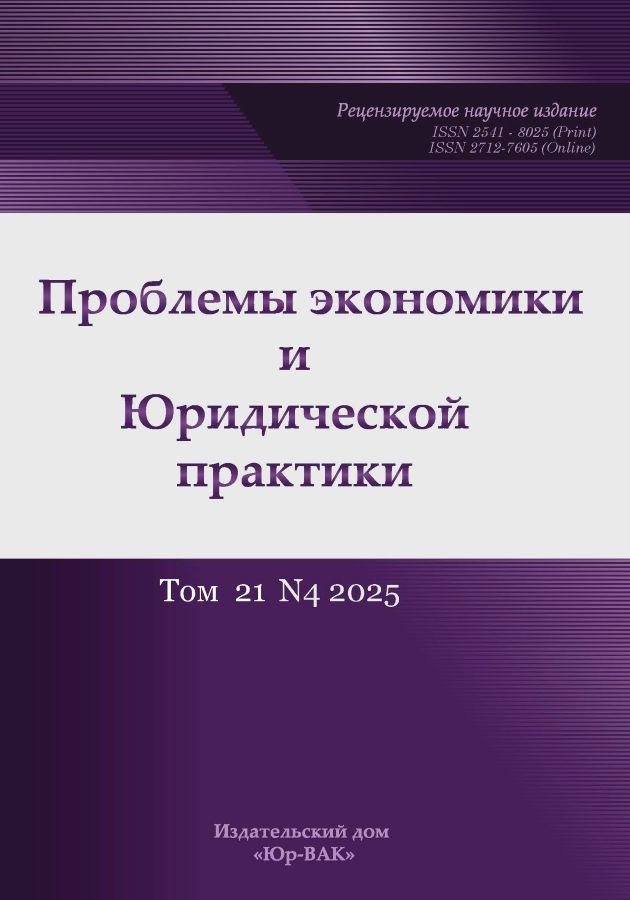Features of legal regulation of labor in peasant (farm) holdings
- Authors: Vasilyeva O.N.1, Novitskaya L.U.1
-
Affiliations:
- Financial University under the Government of the Russian Federation
- Issue: Vol 21, No 4 (2025)
- Pages: 81-86
- Section: Private Law (Civil) Sciences
- URL: https://journals.eco-vector.com/2541-8025/article/view/691576
- EDN: https://elibrary.ru/XZORAQ
- ID: 691576
Cite item
Abstract
Peasant (farm) farms (hereinafter referred to as farms) occupy a key position in the economic system of the Russian Federation, forming a significant segment of agro-industrial production. In the context of modern challenges, including the processes of globalization, climate transformation and technological modernization, the regulatory and legal regulation of labor activity within the framework of farms is becoming increasingly important. The specifics of agricultural production, characterized by seasonality, dependence on natural factors, and the combination of personal and wage labor, place special demands on the legislative design of labor interactions. The relevance of the research is determined by the need to balance the interests of subjects of legal relations—both employees who require guarantees of social protection and employers interested in optimizing production processes. A special feature of the legal status of farms is the synthesis of family and contractual labor interactions, which necessitates a differentiated approach to regulation. This organizational and legal form, being an important element of the agricultural sector, requires in-depth scientific understanding due to the lack of elaboration of the theoretical basis in the domestic legal doctrine. The research is aimed at filling the existing gap through the formation of a conceptual framework for optimizing labor legislation. Farms occupy a strategically important niche in the economic structure of the Russian Federation, forming a significant share of agro-industrial production. The legal regulation of labor relations in farms is carried out through a synthesis of industry-wide labor law norms and special provisions adapted to the specifics of agricultural activities. The fundamental regulator in this area is the Labor Code of the Russian Federation (hereinafter referred to as the Labor Code of the Russian Federation), which sets universal standards for all categories of employers, including farming entities. At the same time, as the researchers note, «the human capital of rural territories remains the key resource of labor potential for the agro-industrial complex»[1].
Full Text
About the authors
Oksana N. Vasilyeva
Financial University under the Government of the Russian Federation
Author for correspondence.
Email: vasilieva_on@mail.ru
SPIN-code: 9177-3271
Cand. Sci. (Law), Associate Professor, Associate Professor of the Department of Legal Regulation of Economic Activity
Russian Federation, MoscowLyudmila U. Novitskaya
Financial University under the Government of the Russian Federation
Email: novilu@mail.ru
SPIN-code: 9141-0522
Cand. Sci. (Ped.), Associate Professor, Associate Professor of the Department of Legal Regulation of Economic Activity
Russian Federation, MoscowReferences
- Kravchenko T.S., Bukhvostov Yu.V. Problems of forming the labor potential of small business entities. Business. Education. Right. 2021. No. 1 (54). Pp. 106–107. (In Rus.).
- Burdukovskaya R.Z. Actual problems of peasant (farmer) farming under the legislation of the Russian Federation. The Legal Almanac. 2023. No. 3(25). Pp. 28–33. (In Rus.).
- Chetaeva K.A. Features of the legal regulation of (peasant) farming. Interactive science. 2023. No. 4 (80). Pp. 129–130. (In Rus.).
- Gudova E.V. Can an employer dismiss an employee without his consent? The Legal Almanac. 2020. No. 3. Pp. 44–50. (In Rus.).
- Yaroshchuk A.Yu., Vorobyov A.V. Land relations in the farming sector of agricultural commodity production in the Volgograd region. Volgograd State Agrarian University (Volgograd, Russia). doi: 10.18411/lj-28-02-2018-74.
- Ashurmetova N.A., Khudaiberdieva F M., Khodzhaeva Sh.A. Economic efficiency of agriculture in a green economy // Proceedings of the international scientific and practical conference «Environmental protection and scientific foundations of the «green» economy». 2025. Pp. 69–70.
Supplementary files









